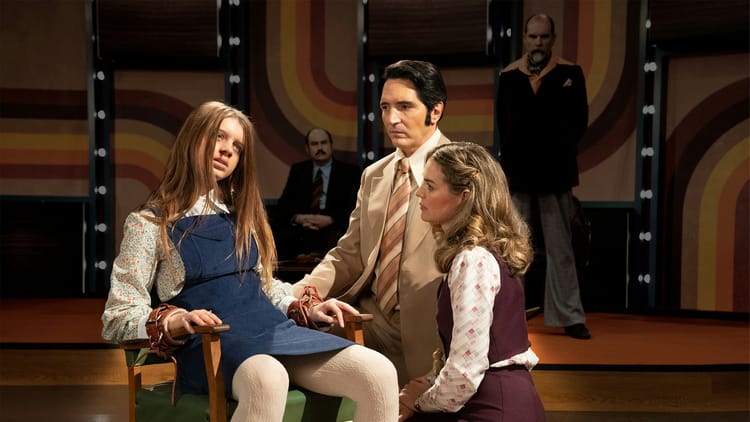The Invisible Man
Going into this movie I wondered how scary could it be if we can't even see the source of our fear? Film is after all, primarily, a visual medium, so what's so scary about something we can't see?
Leigh Whannell writes and directs The Invisible Man, in which Cecilia, played by Elizabeth Moss, runs from the titular invisible man, Adrian, her ex-boyfriend. It's tense, uncomfortable, and honestly for the most part, an unpleasant experience as Cecilia stares into empty gaps of space with abject terror in her eyes.
Whannell understands that what is truly frightening about the invisible man is his omnipresence. He is everywhere at once, and like Cecilia, we are desperately searching for any clue to give us a location. We share Cecilia's terror because we are just as oblivious as she is, if not more so. The camera is handled with an unsettling precision, with empty space left in most shots, implying his presence wherever we look. I found myself intensely focused at each scene, startled by the slightest movement of a curtain.
The camera keeps us unstable, swapping between perspectives, having the audience guessing if we are looking through the man's eyes, Cecilia's eyes, or if we are a third party, helpless and unable to intervene. Control, a recurring theme in the movie, is actualized through its cinematography as we, as an audience, are forced to look at things we don't want to see, terrorized by Adrian like Cecilia.
And Adrian's control is key to this movie. Because we aren't taunted by the filmmaker, a common feeling I get in lower grade horror movies. In The Invisible Man, we're taunted by Adrian. When the camera turns slowly away from Cecilia down an empty hallway, it's Adrian who's controlling us. Adrian's character dominates this movie, from his window smashing introduction, all the way through to the finish.
Not to be outdone, Elizabeth Moss carries her own as our very visible protagonist, struggling to convince the world of Adrian's ploy. What makes Cecilia engaging as a character is that, unlike most tropic horror heroines, she knows what she's doing. There's scarcely a moment when we want to shout "Don't go in there!" Very often, Cecilia will surprise us as well as Adrian, by doing something we don't quite expect with items we knew were in the room. Cecilia is smarter than we are, making this game of cat-and-mouse a little more complicated. All of this is carried by Moss' layered performance. She knows when to push desperation and when to play fear. It's possible to write a whole post about Moss' performance, but that still wouldn't capture the work she's doing in this movie. We feel everything Cecilia feels from start to finish because of Moss, for better or for worse.
When I say this was an unpleasant viewing experience, I mean that more than typical horror movie unpleasantness. There's a constructed parallel to domestic abuse throughout the film, that makes it at times, very difficult to watch. Our terror is not only driven by the science fiction of an invisible man, but the actual terror people endure from abusive and manipulative partners. Undoubtedly, this movie is intensely triggering for anyone who had lived an experience like it. So at times, it feels like this movie is for people free from this type of trauma that can only enjoy it because of this distance. To his credit, Whannell tries to depict the real-world trauma with delicacy and empathy; much of Cecilia's experience with Adrian is implied rather than shown. But right up till its ending, I felt uncomfortable that we were being "entertained" by an extension of real trauma that people endure.
Whannell delivers with this ending, a far more satisfying pay-off than I expected. It's a surprisingly dense and layered ending to a movie that descends into a by-the-books thriller in its final act. It goes beyond the dull metaphor of invisible man as a metaphor for the invisible patriarchy, asking a question that goes beyond the film's initial premise and captures the injustice the movie keeps beneath its surface. And while I may have some issues with its presentation, it's admirable that Whannell and this team stealthily slid in such heavy themes into what could have easily been B-grade horror. These themes don't take a backseat, they drive the horror of this film and it's by tapping into that reality that Whannell makes this such a tense, unsettling, and ultimately, satisfying story.




